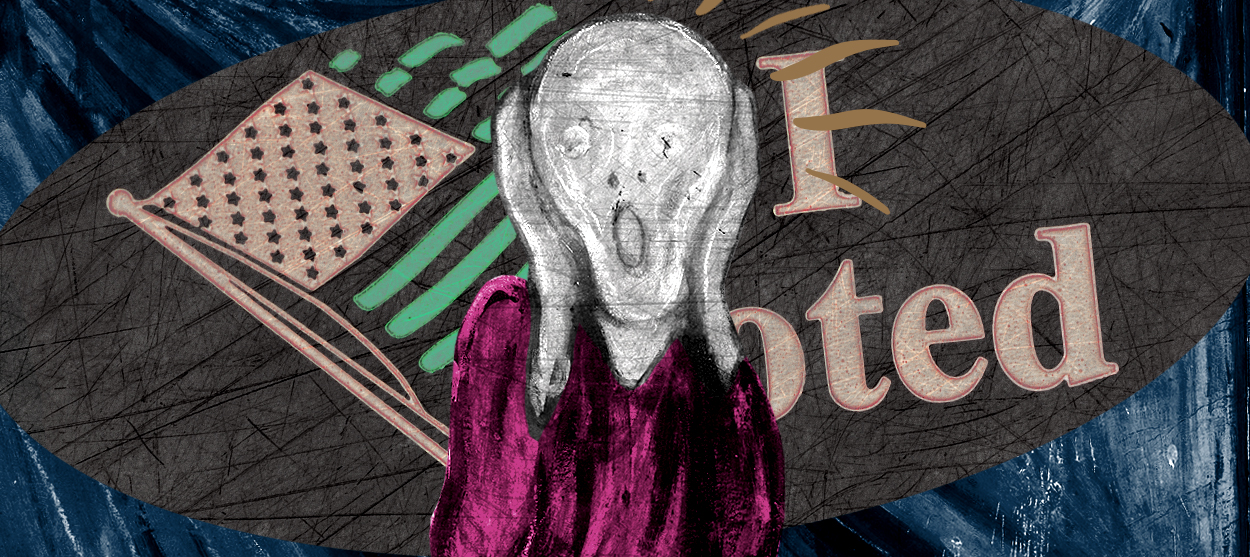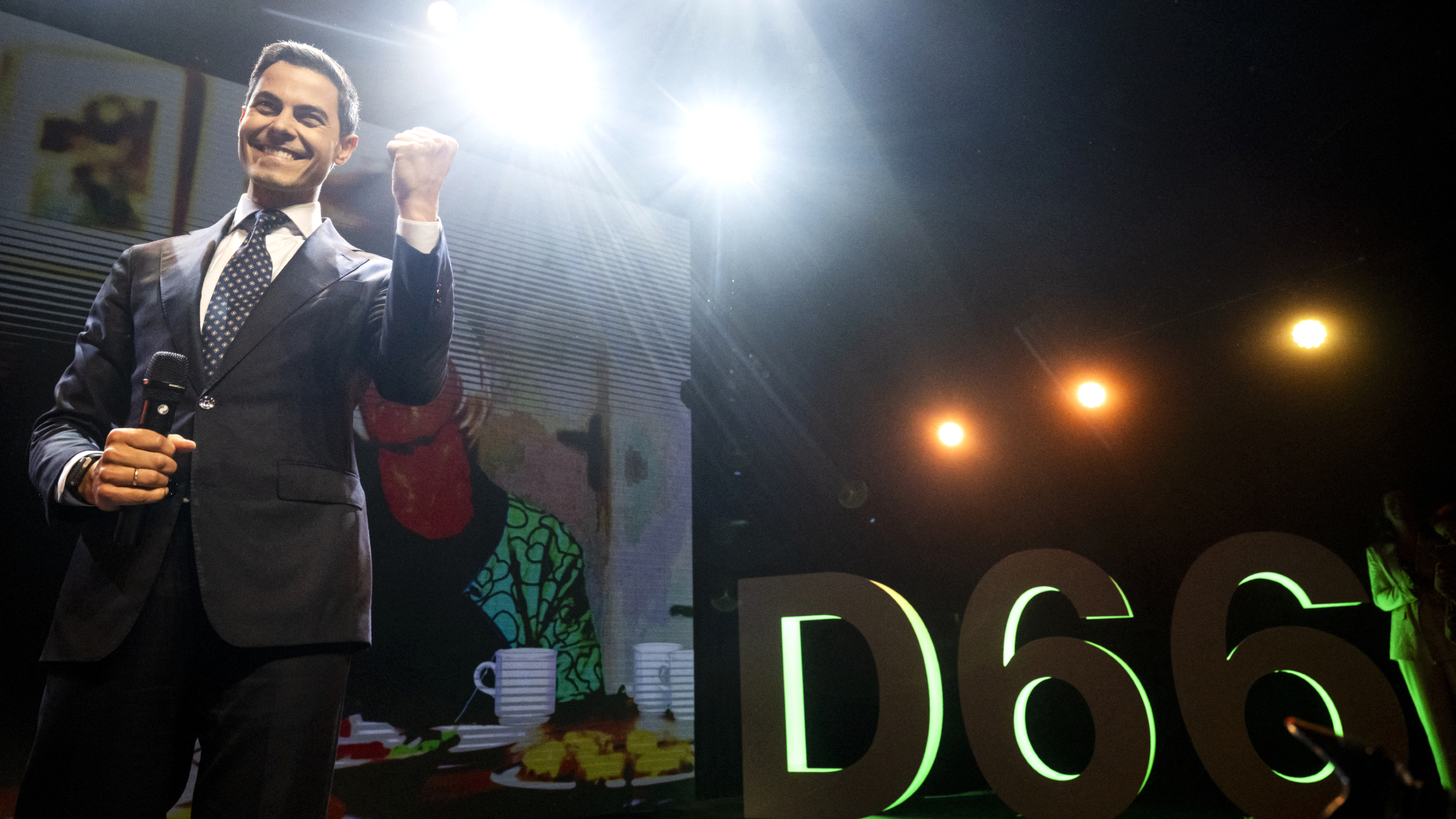The true Election Day nightmare scenario
Democracy doesn't die in darkness. In 2020, it looks far more likely to perish in a fog of electoral confusion.


A free daily email with the biggest news stories of the day – and the best features from TheWeek.com
You are now subscribed
Your newsletter sign-up was successful
With less than two months to go until Election Day, the United States faces a range of possible futures. Some are continuous with the country's long history of peaceful democratic transitions. But others lead to ugly places — including political dysfunction, social breakdown, and even the widespread outbreak of violence on competing sides of partisan conflicts so intense that no established institution can contain and resolve them.
The potential danger arises from the interaction of several variables — the uncanny efficiency of the incumbent's electoral coalition in relation to the Electoral College, which greatly raises the likelihood that Donald Trump can win re-election while losing the popular vote; a likely surge in mail-in ballots as a result of the pandemic; a president quick to raise vague and unfounded accusations of voter fraud; a left highly primed to act out in response to presidential provocation; and a right grown eager to confront left-wing protests on the street. Put it all together with a fog of uncertainty about who really prevailed in the vote, and the country confronts the possibility of serious instability in the wake of Election Day.
Let's begin with the best-case scenario and then move through a series of increasingly dire alternatives.
The Week
Escape your echo chamber. Get the facts behind the news, plus analysis from multiple perspectives.

Sign up for The Week's Free Newsletters
From our morning news briefing to a weekly Good News Newsletter, get the best of The Week delivered directly to your inbox.
From our morning news briefing to a weekly Good News Newsletter, get the best of The Week delivered directly to your inbox.
Biden wins bigly. Yes, I favor Joe Biden in the election and very much want Trump to lose. But that's not the primary reason I consider a Biden landslide the best possible outcome. No one seriously believes that Trump is going to win the popular vote; if he prevails, it will be because he reproduces or expands on his 2016 margin in the Electoral College. That means the greatest chance for a decisive outcome with maximal legitimacy is a Biden landslide so big that no one from the president on down can reasonably dispute it.
In practical terms, this would mean Biden winning the popular vote by his current polling lead (7-8 percentage points) or more. Such a strong showing would likely lead him to prevail by a decisive margin in the three Midwestern states that flipped to Trump four years ago — Pennsylvania, Michigan, and Wisconsin — while also clearly winning Florida and Arizona. Since everyone, including Republicans, assumes that mail-in ballots will lean heavily Democratic, clear victories in these states based on in-person voting on Election Day would point toward a wipe-out. Trump would have no choice but to concede, sparing the country the dark outcomes that could await if the results turn out differently.
Trump runs a replay of 2016. A distant second-best outcome on Nov. 3 would be a solid Trump victory in the Electoral College driven by a last-minute pre-election tightening in the polls and the surprise appearance of elusive "shy Trump voters" at polling places in the states the president most needs to win. This wouldn't be pretty. Trump's re-election would be bad for the country, regardless of how it happens. That it would almost certainly be a result of the Democrat losing the election after winning the popular vote for the third time in the past six presidential elections would make it maximally galling to a plurality of voters.
But that would be a problem for another day. Although some on the left are gearing up to contest the election in the event of another Electoral College-based victory for the Republicans, such moves are unlikely to prompt as much unrest as we'd see in other scenarios. The Electoral College may be terrible, but it is how this country has always elected its presidents — including in two recent elections (2008 and 2012) when the Democrat prevailed by healthy margins. That means the claim that the institution is a structural impediment to Democrats winning the presidency is weak. It's far more accurate to say that the Democrats' current electoral coalition is exceedingly inefficient when it comes to winning the Electoral College. This is something that could be addressed by the party's future nominees seeking to appeal to a different set of voters in a different set of states.
A free daily email with the biggest news stories of the day – and the best features from TheWeek.com
The indecisive outcome — stage 1. A solid Trump victory in the Electoral College (combined with the loss of the popular vote) might be bad, but much worse outcomes are possible. In a recent column in The New York Times, David Brooks sketched one that would be far more dangerous. It starts like this: Trump is ahead in the crucial battleground states during early counting of ballots on the evening of Election Day and declares victory without Joe Biden conceding. Later on, as mail-in ballots are counted, the lead shifts in the Democratic direction, putting Biden ahead. This eventually prompts Trump to reject the validity of the outcome on grounds of voter fraud, with the conservative media complex backing him up to the hilt. Imagine the multi-week legal and political battle surrounding the Florida vote count in 2000 but multiplied across numerous states and with Trump and his media cheerleaders pouring conspiratorial fuel on the fire every hour of every day.
After setting up this nightmare scenario, Brooks backs away from its darkest implications to propose a "sustained campaign of civic action, as in Hong Kong and Belarus, to rally the majority that wants to preserve democracy, that isolates those who would undo it." That sounds nice. Except for the fact that neither Beijing nor Belarusian president Alexander Lukashenko has backed down in the face of protests. On the contrary, they have stood their ground, and in Hong Kong at least, the authoritarians are clearly winning. Can Brooks seriously believe that Donald Trump — a man who allegedly associates selflessness with being a loser and a sucker — would be chastened and shamed by throngs of protesters into stepping down from the presidency?
The indecisive outcome — stage 2. Assuming Trump doesn't reverse course from a lifetime of unmodulated self-aggrandizement, the country would face two paths forward, neither of them good. The first would be a military intervention (a coup) to depose the president. Unlike resistance fantasies of a group of officers nobly facing down Trump in the name of democracy after he unilaterally declares himself dictator for life, in this more realistic scenario Trump would benefit from ambiguity. The very indecisiveness of the election would enable him to portray himself as the defender of democracy against those who would circumvent the rule of law to defy the rightful outcome of the vote. That would make the military intervention maximally fraught, with considerable potential for bloodshed as Trump supporters express their fury in the street. And even if it succeeded, it would set a terrible precedent for the American future.
The second way forward would be just as bad. In this scenario, the military doesn't intervene, but the demonstrations Brooks prophesies quickly spiral out of control and descend into violence. Instead of a larger version of the peaceful "pussyhat" rallies from the period following Trump's election in 2016, any post-2020 election protests would be highly chaotic affairs, in which hundreds of thousands of well-meaning patriotic Americans mix with antifa troublemakers on one side and pro-Trump vigilantes on the other. Marches, speeches, chanting, rioting, looting, burning, fist-fights, paint balls, gunplay — all of it would mix into a tableau of anarchy resembling a televised civil war more than a demonstration of civic resolution to settle the outcome of the election in the fairest way possible. And through it all, Trump would be there, doing everything in his power to provoke further bad behavior in order to make the case that those taking to the streets are the true enemies of the people, refusing to accept the outcome of a democratic election.
This is the true nightmare scenario because in the absence of certainty about who really won, and lacking any broadly agreed upon means of settling the dispute, each side will feel empowered to think of itself as the indisputably rightful victor and the other side as illegitimate usurpers.
Democracy doesn't die in darkness. In America in 2020, it looks far more likely to perish in a fog of electoral confusion.
Want more essential commentary and analysis like this delivered straight to your inbox? Sign up for The Week's "Today's best articles" newsletter here.
Damon Linker is a senior correspondent at TheWeek.com. He is also a former contributing editor at The New Republic and the author of The Theocons and The Religious Test.
-
 The ‘ravenous’ demand for Cornish minerals
The ‘ravenous’ demand for Cornish mineralsUnder the Radar Growing need for critical minerals to power tech has intensified ‘appetite’ for lithium, which could be a ‘huge boon’ for local economy
-
 Why are election experts taking Trump’s midterm threats seriously?
Why are election experts taking Trump’s midterm threats seriously?IN THE SPOTLIGHT As the president muses about polling place deployments and a centralized electoral system aimed at one-party control, lawmakers are taking this administration at its word
-
 ‘Restaurateurs have become millionaires’
‘Restaurateurs have become millionaires’Instant Opinion Opinion, comment and editorials of the day
-
 ‘Poor time management isn’t just an inconvenience’
‘Poor time management isn’t just an inconvenience’Instant Opinion Opinion, comment and editorials of the day
-
 Kurt Olsen: Trump’s ‘Stop the Steal’ lawyer playing a major White House role
Kurt Olsen: Trump’s ‘Stop the Steal’ lawyer playing a major White House roleIn the Spotlight Olsen reportedly has access to significant US intelligence
-
 Japan’s Takaichi cements power with snap election win
Japan’s Takaichi cements power with snap election winSpeed Read President Donald Trump congratulated the conservative prime minister
-
 How realistic is the Democratic plan to retake the Senate this year?
How realistic is the Democratic plan to retake the Senate this year?TODAY’S BIG QUESTION Schumer is growing bullish on his party’s odds in November — is it typical partisan optimism, or something more?
-
 The billionaires’ wealth tax: a catastrophe for California?
The billionaires’ wealth tax: a catastrophe for California?Talking Point Peter Thiel and Larry Page preparing to change state residency
-
 Bari Weiss’ ‘60 Minutes’ scandal is about more than one report
Bari Weiss’ ‘60 Minutes’ scandal is about more than one reportIN THE SPOTLIGHT By blocking an approved segment on a controversial prison holding US deportees in El Salvador, the editor-in-chief of CBS News has become the main story
-
 Has Zohran Mamdani shown the Democrats how to win again?
Has Zohran Mamdani shown the Democrats how to win again?Today’s Big Question New York City mayoral election touted as victory for left-wing populists but moderate centrist wins elsewhere present more complex path for Democratic Party
-
 Dutch center-left rises in election as far-right falls
Dutch center-left rises in election as far-right fallsSpeed Read The country’s other parties have ruled against forming a coalition
